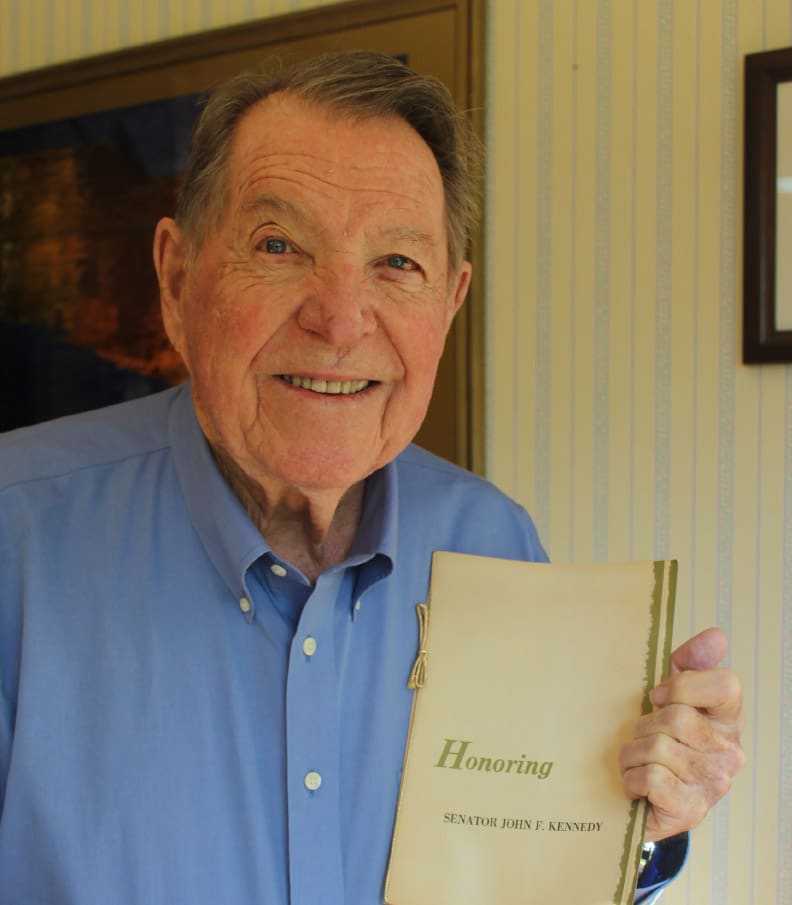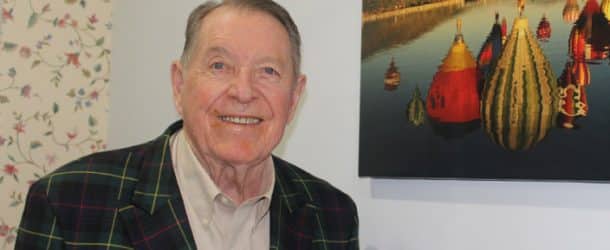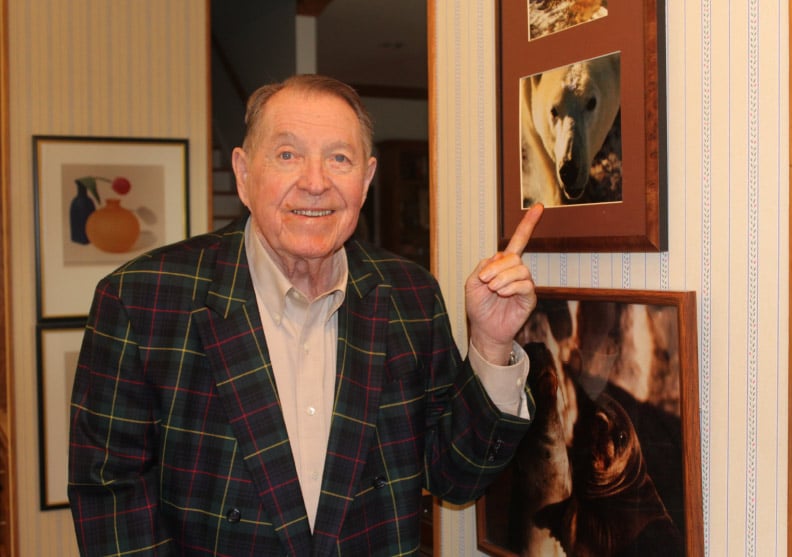90 Years And Going Strong
By Scott E. Raymond
In September, retired Louisiana Supreme Court Justice Jack Watson reached a milestone that many others never realize: he turned 90.
When I recently interviewed him and asked him if the day he became a nonagenarian (someone in their 90s) made him feel any different, he emphatically replied, (it was) “a thrill.”
Since retirement from the bench, Watson has spent time traveling with his wife of almost 60 years, Sue, who, like Watson, is an attorney. In recent years, they have written several articles about some of their trans-continental trips, which were also documented along with another of his favorite passions, photography.
The Watsons have a son, who is also an attorney, and three grown grandchildren.
Life seems good for Justice Watson. Tall in stature, he appears in very good health and he obviously stays active.
He has had, without a doubt, a very interesting life. There, at his dining table, we sat down and talked about it.
I Was Raised All Over
The son of a civil engineer who worked for the Louisiana Highway Department, Watson was raised wherever there was a state highway construction job his father was in charge of.
“I was raised all over,” says Watson. “I was born in Jonesville, Louisiana in 1928. My father worked at various spots around the state of Louisiana. Everywhere he had a project, we moved and we lived there.”

This photo by Jack Watson, ‘Reflection of Leaves on the Water’ – Bond Falls, Michigan, won 2nd prize in a San Diego photo contest.
Photo by Scott E. Raymond
Watson says his earliest memory is while living in a house near the Tensas River in north Louisiana.
“I had a dog and his name was Rin Tin, and Rin Tin and I went walking behind the little house where we lived out on the Tensas River and we looked down and there was this object coiled up down there, a rattlesnake. We had sense enough not to fool with it and I went and told my mother that there was a rattlesnake behind the house!”
Watson’s moves while in elementary grades included Jonesboro, where his mother was born and raised and where she had been a home economics school teacher; and Crowley, where he says he asked the teacher why the other student’s pronunciation of some words was different than his. The teacher told him, “That’s because they are of Acadian descent and that’s the way those words are pronounced by people of Acadian descent.”
Other moves while in elementary grades included Leesville, Shreveport and then back to Jonesboro for the seventh grade. Watson says he didn’t get along well with the other seventh grade kids at the school.
“I was the smartest guy in the class and that didn’t go over very well. They arranged to have a boxing match between me and one of their guys, and we did, we had a boxing match. And I don’t think I ever hit him very well, but he hit me one time pretty good, didn’t knock me down, but hit me.
“That passed on and then we had graduation of the seventh grade in Jonesboro, Louisiana elementary school and guess who was valedictorian of the class? (I was) because I had the best grades in the class (chuckle)! I made a speech, a valedictorian speech.”
Watson completed the ninth grade in Jonesboro and then moved to Alexandria “where I went to and graduated at Bolton High School.”
From Alexandria, Watson’s family moved to Lafayette. Watson started college at LSU, but because of costs his father told him to transfer to the University of Southwestern Louisiana (USL), which he did. Watson says he was there long enough to get his BA degree. While there, he was on the debate team.
“During my college studies,” Watson says, “I participated in debate. My colleague Raymond Zagone and I were the Senior Men’s Debate Team for USL and won a lot of debates, including the Durant Oklahoma Championship.”
After USL, Watson went to LSU Graduate School for a year, which he says later proved to help him qualify for Officers Candidate School while enlisted in the Air Force.
A Stint In The Air Force
After Graduate School at LSU, Watson enlisted in the Air Force. Sixteen months later, he got into Officers Candidate School — a six-month program that he says was very good.
“The experience in Officers Candidate School really was very good because we learned things about — you have to march straight and you have to eat in a proper manner — discipline and all that sort of thing. That was for the first half of Officers Candidate School. Then you became an upper classman and you had some underclassmen whose career you had some effect on; you guided them and had them do things right. Officers Candidate School was one of my best experiences.”
From there, Watson went to school at the Georgetown University School of Languages and Linguistics in Washington, D.C., which, he says, was a very interesting school.
“I remember one of our instructors was an advocate of, ‘We’re going over and bombing the Russians!’ His view didn’t prevail, so we didn’t go over and do that. After we completed the program at Georgetown, I think I got some sort of degree with honors.”
Before Watson’s four years with the Air Force were completed in 1954, he had been stationed in the Philippines, Japan and Korea during the Korean Conflict. He was honorably discharged a First lieutenant.
A Career In Law And A Memorable Event With Sen. John F. Kennedy
Watson says his interest in a career in law began about the time he contacted the Air Force and that he had “always had it in the back of my mind that I was going to go to Law School.

John and Jacqueline Kennedy at the family compound in Hyannis Port, Mass., in 1959, the year they attended a political dinner and speech event in Lake Charles.
Photo by Mark Shaw
“I don’t know exactly what influenced me to do that,” he says. “I had a couple of cousins who lived in New Orleans who were lawyers and I … thought that was a pretty good career (path) to take and so I went for it.”
Watson attended law school at LSU from 1954-1956 and worked his way through law school with the G.I. Bill and his work in the Legislative Council at the Louisiana State Capitol.
While there, he met his future wife Sue Carter, who was also attending Law School at LSU in Baton Rouge. Also while there, Watson participated in the Moot Court Championship.
Says Watson: “During Law School, my colleague Richard Gauthier and I won the Moot Court Championship of LSU Law School. The Championship was concluded by the argument before the Louisiana Supreme Court, who had traveled to Baton Rouge to judge the finals of the Moot Court Championship.
“It is interesting to note that the Moot Court winners exactly 10 years prior to our win included Sen. Russell Long, who became a good friend of mine in later years.”

Justice Jack Watson holding a program ‘Honoring Senator John F. Kennedy’ for the event in Lake Charles in 1959. Photo by Scott E. Raymond
After graduation from LSU Law School in 1956, Watson came to Lake Charles and began practicing with the law firm of King, Anderson and Swift. After Sue Carter’s graduation from LSU Law School and earning a Master of Laws degree at Tulane Law School, she came to Lake Charles and also worked for a local law firm. Watson and Carter got married in 1958, and for two years thereafter managed their own law firm.
In early January of 1960, Sen. John F. Kennedy would announce his candidacy for president of the United States. Just a few months earlier, in the fall of 1959, a two-day October political visit to Louisiana had been planned, which included Lake Charles.
At the Pioneer Club, on the 10th floor of the Pioneer Building — then located at 326 Pujo St. (now Lake Charles City Hall) — on the evening of Friday, Oct. 16, 1959, attorneys Jack and Sue Watson took part in a political dinner-speech event with Sen. Kennedy and his wife “Jackie” that would be long remembered.
“Something interesting while Eddie Shaheen was DA (District Attorney): He became great friends with John F. Kennedy and John F. Kennedy was arranging a dinner in Lake Charles,” says Watson.
Watson says Shaheen wanted a couple of young people on the committee to organize the event and he was asked to be one of them. Watson was assigned to bring the U.S. flag to the dinner and have it placed near the podium where Kennedy would give his speech. He says he was extremely impressed with Kennedy, whom he described as, “a charmer.”
“We got to be friends with Sen. Kennedy and his wife Jackie,” says Watson. The dinner was for the Democratic Party, and Watson says he is the last surviving member of the committee that brought the future president of the United States to the event.
“It was really a pretty successful thing because we did well (Kennedy’s election for president in 1960) in Calcasieu Parish and the surrounding area,” says Watson. Through his friendship with Judge Edmond Reggie of Crowley, Watson became friends with some of the Kennedy family in Nantucket, Mass.
“We got to know Ted Kennedy, (and) Ethel — she was Bobby’s wife — and other people up in Nantucket,” he says.
In 1960, Watson began his public service career working for a year as City of Lake Charles Prosecutor. Then he was appointed assistant district attorney by newly elected district attorney Frank Salter. Watson held that position for three years.
32 Years On The Bench
In 1964, Watson ran for and was elected district judge of the 14th Judicial District. That position marked the beginning of a very distinguished 32-year career in various capacities on the bench: judge, ad hoc, of the Louisiana 1st Circuit Court of Appeal, 1972 and 1973; judge of the Louisiana 3rd Circuit Court of Appeal from 1974-1979, and associate justice of the Louisiana Supreme Court from 1979-1996.
In referencing his many years on the bench, which concluded with 17 years as a Louisiana Supreme Court associate justice, Watson mentions something someone else has said about him:
“I customarily do a lecture for John deGravelles, who is now a federal judge, and John deGravelles (referred to) me (as): ‘A guy who has done it all.’ Once a year, I lecture in deGravelles’ class in Greece on maritime law.”
I ask Watson if there is any advice he would give young people today considering running for public office or, specifically, judge.
“Well, to run for judge you’ve got to be a lawyer,” says Watson. “You would have to run for district judge first, and the only advice that I would give them would be, if you have a lot of relatives in Calcasieu Parish and if you are a big church member, that can make a difference.
“I will tell you that when I was on the District Court, I ran for district judge and I ran against four other lawyers. One reason that I ran for it was that Frank Salter had just been elected, defeating Eddie Shaheen, and he encouraged me to run for the District Court, which was an additional court established at that time. So I did.”
Watson says that during his time on the Louisiana Supreme Court “I did the work and there was a lot of it. I did it just like everybody else did theirs. I pulled my share (of the work).”
After Justice Watson retired from his judicial tenure, he was appointed a member of the faculty at Southern Law School and taught there two years.
“I taught Common Law Property,” says Watson. “That’s the system of property they have in the Common Law states. People ask me, ‘How come you taught Common Law Property?’ And my answer was because I knew as much about it as anyone else (chuckle)!
“I was impressed. I had, I think, four students one year in a semester, and six students another year, and I was really impressed with the students, the African-American students I had in my class.”
90 Years And Going Strong
From all appearances in the rooms about me during the interview, Jack and Sue Watson love traveling and, in particular, Watson loves photography.
“I got interested in photography when I shipped out to go to the Philippine Islands in the Air Force,” says Watson, “and I had just acquired a 35mm camera. From that time on, I had a substantial interest in photography.”
We segue to Watson recently turning 90 in September and I ask him how the birthday celebration went. He says they invited some of their friends to “the best restaurant in town.”
“We had a few people there to help celebrate my 90th birthday. We had a pretty nice party,” he says.
I ask Watson to what he attributes reaching the milestone of nonagenarian and his answer is quick and to the point.
“I think two things: leading a relatively clean life and being happily married to Sue,” he says.
I ask him if there is any advice he would give to others who have the goal of reaching their 90th birthday.
“One thing I would strongly advise people that want to live to an older age is (if they smoke) to give up smoking.”
Near future plans for Jack and Sue Watson are to take return trips to New York University in New York City; Choate Rosemary Hall in Wallingford, Conn.; and Southern Methodist University in Dallas.
Addendum: Henrietta Sue Watson has been married to Justice Jack Watson for 60 years on Dec. 26. She is a former Commissioner of the Lake Charles Port and Terminal District Board — the first woman to serve on that board. She is also a former member of the Board of Directors of Cameron State Bank, where she was vice chairperson.

















Comments are closed.